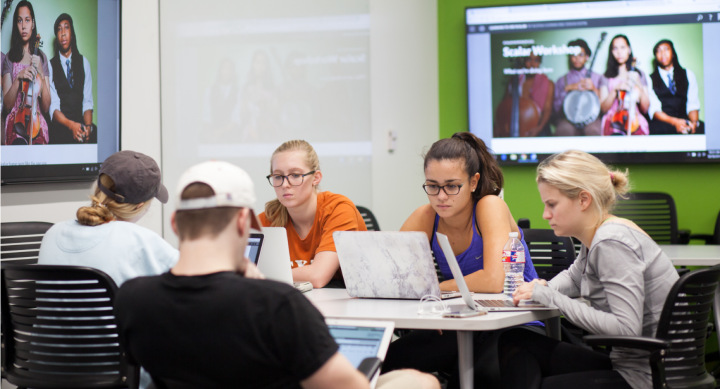
Workshops at the University of Texas Libraries are free, drop-in workshops on topics related to research, digital tools and more. All workshops are free, open to everyone and located across Libraries locations. Workshops with invited speakers or co-organized with outside institutions may be subject to registration fees. Non-UT affiliated persons can connect to our WiFi network through the UTGuest network or EduRoam.
Upcoming Workshops
Digital Humanities Workshop: An Introduction to Creating Visual Interactive Timelines will introduce attendees to TimelineJS, an open-source user-friendly tool to create simple or complex timelines.
Participants will create visually dynamic and interactive timelines to organize and present research that can be embedded into any website. The virtual workshop will demonstrate how to utilize the product in a variety of ways and the steps to create a project reflective of individual research needs. As a case study, participants will be visualizing the La Onda Campesina newsletter (1978-1980) created by a prominent figure in the Chicano Literary movement, Abelardo Delgado, whose collection is housed at the Benson.
Snacks will be provided to in-person attendees!
Location: Zoom
Register: https://utexas.zoom.us/meeting/register/_04x2vwNRIKUNen1anm7KQ#/
The Scan Tech Studio will be at BIPOC PoP teaching folks how to archive food memories through zinemaking, digital archiving, scanning, oral histories, and mapping.
Interested participants are encouraged to bring a food memory they'd like to preserve. This can be a recipe card, photo, anecdote, receipt from restaurant, wrappers from snacks, menus, coasters, lunchboxes, etc.
Drop-in anytime!
Snacks and materials provided!
Location: Robert L. Patton Building (RLP) - Glickman Conference Center
Join us Tuesday, March 10, from 11 am-12 pm for Creating Interactive Applications in Python with PyGame!
This creative coding workshop introduces attendees to PyGame, a free and open-source cross-platform library for the development of multimedia applications like video games using Python.
After some time exploring key concepts of the software, its many features, and sample projects using the library, we will collaboratively build a sample application to explore PyGame’s many possibilities.
Attendees of all technical experience levels are welcome! Registration is not required, although we would appreciate if you would submit this form to confirm your interest.
Location: Perry-Castañeda Library Scholars Lab, Data Lab (PCL 2.202) or Zoom
Attendees are recommended to bring their own laptops (Mac or PC). In the event that they are unable to bring their own device, they can still set up an online Zotero account using the Data Lab computers.
All are welcome; however, this workshop will be particularly useful for advanced undergraduates and all graduate students.
There will be snacks and coffee available!
More information about Zotero can be found on this research guide: https://guides.lib.utexas.edu/citation-managers/zotero
Location: Perry-Castañeda Library Scholars Lab, Data Lab (PCL 2.202)
Join this AI & Research workshop on Zoom to learn about research applications of local AI models that you can run on your own system instead of in the cloud. There will be a focus on the advantages and disadvantages of a local AI approach and we will specifically look at cost, privacy, openness, and consistency. We will also cover essential AI considerations including policies and ethics, discuss steps for getting ready to use local AI models, and demonstrate the use of local AI in research workflows.
Registration required, so sign up today!
Location: Zoom

